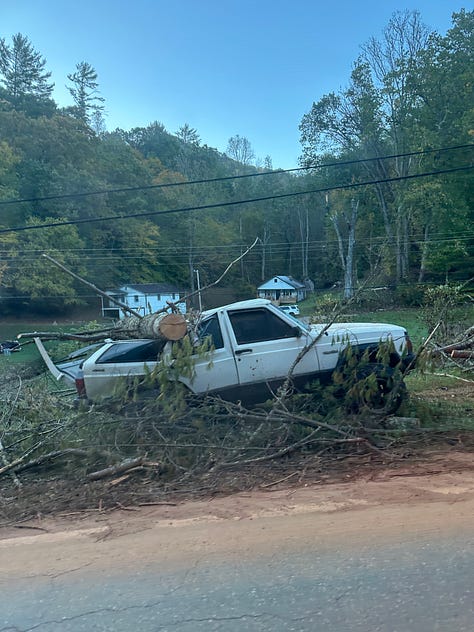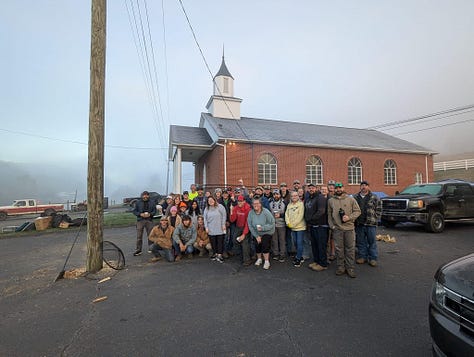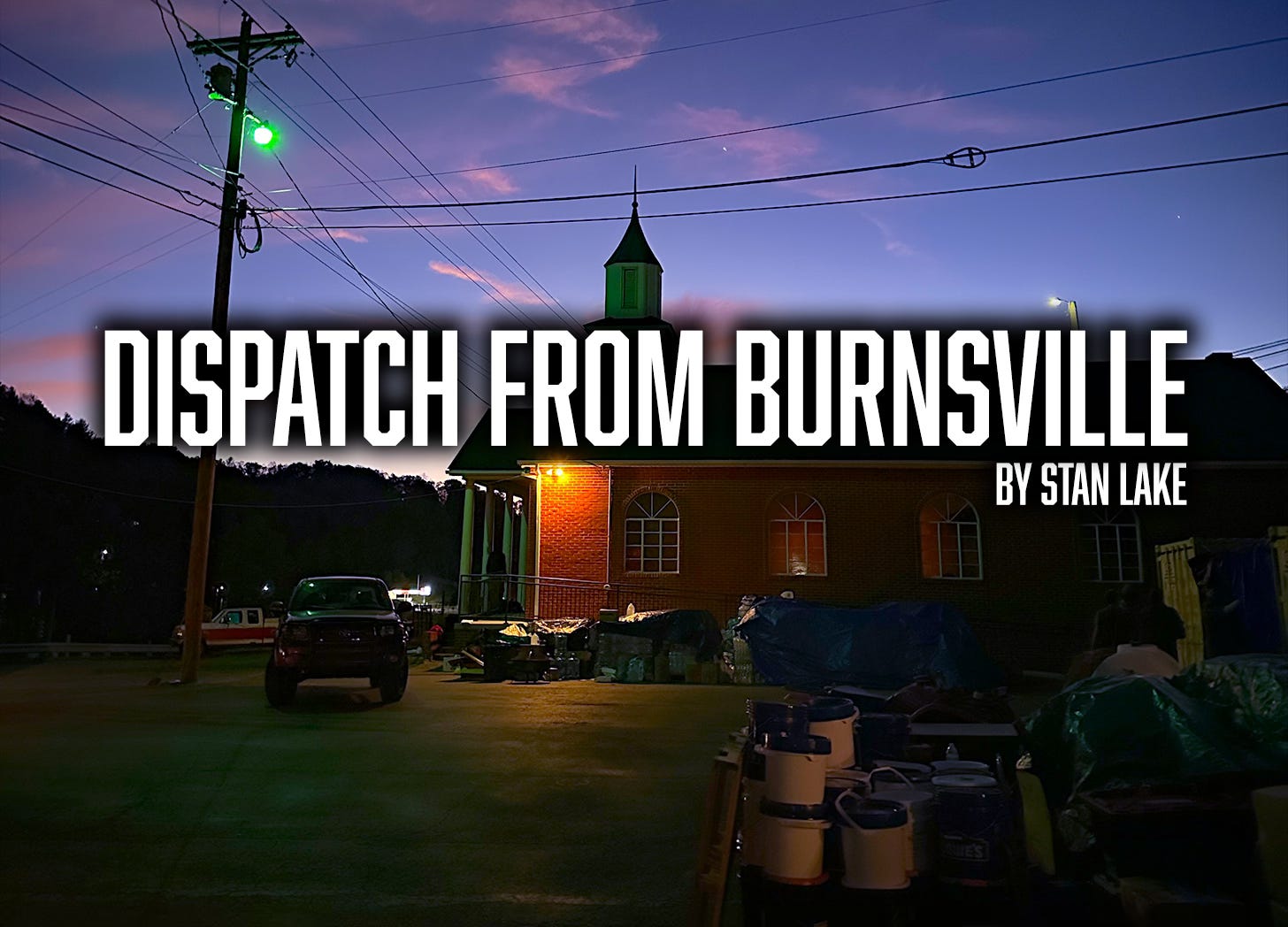**This is a long one but I felt it was important to share, and not wait until Friday**
A little over three weeks ago, Hurricane Helene smashed into Western North Carolina like a sledgehammer hitting a watermelon. The damage has been unfathomable. In what world do people living at least 400 miles from the Ocean need to consider hurricanes? Yet, one of the biggest ones to make landfall in modern history made its way through the North Carolina mountains, leaving a wake of destruction that will take years to rectify fully.
Facebook and other social media outlets were flooded with information and speculation about the devastation. Everyone had an opinion. Many were politically motivated. Most were wrong altogether. Not much was coming from that region itself because the storm essentially cut them off physically and digitally from the rest of the country. As a result, we were left to wait and see just how badly our neighbors to the west were faring.
My sister, a news reporter with WFMY News 2 out of Greensboro, went to cover the storm on the Thursday it hit. She was stranded there with her cameraman until Saturday because mudslides and rising rivers blocked their escape in all directions. She told me how terrifying it was to be stuck—even briefly—without a way home. After a day or two, they ran out of food and staunched their hunger with the meager box of protein bars they had in their news vehicle. This pales in comparison to what the people who live in this area dealt with during the storm and continue to deal with in the aftermath.
Information began trickling in as people were able to connect to WIFI or cell service once they got out of the most affected areas. That’s when the rest of us began seeing the sheer catastrophe of what happened. Here’s the thing: even that doesn’t do justice to it. I’m convinced that no video or photo can truly show the scale and magnitude of this event. Still, more information flowed through social media. Tempers flared at the perceived ineptness of government agencies or lack of response to certain areas, and whether that is true or not is not for me to decide, but what I can say is that unless you’ve seen just how hard it is to get to some of these communities, it's amazing anyone has received help at all.
Everyone uses this Fred Rogers quote regarding tragedies, but I’ve never seen a more apt time for it. “Look for the helpers. You will always find people who are helping.” So, I began to look. From the moment people were allowed back into the area, I saw people grabbing supplies and who knows what else and heading west. Many people I know just saw the need and helped in any way they knew how. Some went to local airports to help sort through the donations being sent in; some sent money, others grabbed chainsaws and medical supplies and anything else that was needed and just said, “Here I am, send me.”
My best friend, DC, took nearly two weeks off work and stayed in a shelter in Hendersonville, NC, to help with whatever they needed. Then he linked up with a ministry called “Chainsaws for Christ” in Burnsville, NC, and stayed there helping however they needed. Once he came back to work this past week, he decided there was still work to be done, so he’s gone back on the weekends to help. Seeing all that he had been doing inspired me to do the same. Sometimes, our best intentions and want to help can be thwarted by simply not knowing how or where to help.
I decided I had no good excuse not to help, and when DC said I could ride with him to Burnsville, I figured I’d better jump on that opportunity to serve. We left the minute after I got off work Friday and drove three hours west. I began to witness firsthand the destruction that, up until this point, was simply something I’d heard about. There were mudslides along Interstate forty and areas where whole mountains seemed to have just been sheared off. Trees were down along the interstate almost the entire route.
When I asked what we’d be doing, DC just said, “It could be anything, man.” He told me how one day they shoveled out the mud from a church that had flooded, another day they cleaned out putrid meat from deep freezers somewhere, and many days they helped distribute donations and unloaded trucks.
I had no idea what to expect but decided it wasn’t about me, and I’d help in any way I could. We arrived at Riverside Baptist Church around an hour before sunset on Friday, and the entire parking lot was full of people working like ants organizing boxes of clothes, diapers, generators, gas cans, propane tanks, baby wipes, you name it, they had it. It was humbling to see. The people were so thankful we were there to help and some of the nicest, heartfelt people you’ll ever want to meet.
We unloaded our bags and sleeping gear and found a spot in the dank basement of the church. We were just thankful there was a spot to sleep left because the guys who came after us slept in the bed of their pickup truck. We contemplated doing the same before luckily finding an empty room in the basement. That basement had flooded in the last week and still smelled strongly of mold, but it was dry enough and warmer than the truck bed. A win is a win. DC and I had slept in much worse conditions in Iraq together.
The next morning, we awoke to a thin layer of frost on everything outside. We huddled around a small fire pit in the parking lot and awaited instructions. Many people needed firewood since the power was still out in a lot of the surrounding areas. We were put on a team with two other men to go and run chainsaws and log splitters to meet that need. Before we left the church, they made us circle up and hold hands, and someone prayed over the group. It’d been a while since I’d been involved in any sort of ministry, but I’ll tell you something: this made sense.
Once we got to the area where we’d be working, and I saw the mountain of logs we’d be cutting for the log splitter; I was a little intimidated. Moreso, when I was handed a heavy eighteen-inch Stihl chainsaw and asked if I knew what I was doing. I always answer yes to those questions, but I rarely ever know what I’m doing. Thankfully, this time, I did have some experience working with chainsaws. That didn’t mitigate how fast cutting massive pine and oak logs into fourteen-inch lengths and throwing them into a pile for the log splitter would sap my energy. I’ll spare you the details of how I had to take a couple of breaks after several hours because my pride almost made me pass out from heat exhaustion, but we got the job done.
The best part of the day was when we were invited into one of the three-family homes on this property for lunch. Three sweet elderly ladies were sitting around a wood-burning stove in this house, and they’d made us homemade vegetable beef soup, grilled cheese sandwiches, and peanut butter oatmeal drop cookies. I felt the life come back to my sore muscles with each bite. It was so humbling to sit at this table and hear them tell of all they’d dealt with in the last few weeks since the storm. I almost felt guilty to be eating because of how hard supplies were to come by. I’m sure I can speak for the other three men at the table with me when I say that I’m sure that meal blessed us more than the wood blessed them. If not, it was a mutual blessing for all involved. My body felt broken, but my soul was full, and my heart was broken for these people. On our way off the property, I saw a twelve-year-old little boy running a chainsaw as his dad drug them with a tractor off the road. No one was immune from helping put the community back together. It was beautiful in its tragedy. Again, look for the helpers. Everyone was involved.
When we arrived back at the church, we helped unload trucks and organize generators and other items so they wouldn’t just walk off. That evening, we all met back up at the church, and all the teams converged on the fellowship hall for a meal the ladies back at the church made for us. Everyone shared about their day, and it felt good to be part of something. These people were complete strangers, yet we all felt the same call to serve. Many of them had been here since a few days after the storm, serving day after day. So, when you hear all the bad news about this organization or that government agency doing or not doing what they should know, there are helpers everywhere.
Before we bedded down in our basement abode late Saturday night, Brent, the founder of Chainsaws for Christ, came down to hang with us. He told us that just in the last few hours, he’d had somewhere around 600 missed texts and over 200 missed calls. Many were from numbers he didn’t recognize. People just wanted to offer help. He spent almost every moment I saw him answering calls and texts and simply could not keep up. Brent’s face had a mix of weariness and an overpowering joy that sustained him. He’s the real deal.
While we were talking before bed, he told us that a crew from Anchorage, Alaska, was arriving after midnight. They felt inspired to help, loaded up heavy coats and other items of need, and made the drive across the continent. We shared with him that while splitting logs during the day, a pickup truck with Ohio plates pulled up to us and asked us if we needed any chainsaw oil and chains, among other supplies. We talked with them and found out they just saw there was a need and realized they had no excuse not to make the drive, so they did. People are amazing!
People often have the misconception that organizations like this are simply down here to win converts to Christianity, but these people were here to serve. If people converted, sure, that’s a bonus, but they were there to meet the needs of a hurting community—whatever that may be. Some people needed power, others simply asked for prayer, and the organization obliged both. They weren’t proselytizing; they were being the hands and feet of Christ. Brent and his wife Kristin—who is the logistics mastermind—are the embodiment of the type of Christian I want to be. They serve with their full heart and are making a huge impact in Burnsville, North Carolina, to help set things right.
Sunday, we were given a list of names and addresses to triage the needs so the organization could prioritize work crews this coming week. DC and I chose to drive to the furthest point from Burnsville and work our way back before leaving for home. There were flipped vehicles in ditches, trees on houses, and hillsides that were completely gone. We saw railroad tracks washed into rivers now ten times their original width. There were hasty signs painted on cardboard saying people were safe. Signs spray painted on buildings that said, “Looters will be shot.” Roads were washed out, and sand and rocks were everywhere. Remember, this is nearly three weeks after the storm. A lot had been cleaned to make the roadways passable, but the damage was immeasurable. It was awesome in the worst of ways. You just can’t put words to the things we saw as we drove to offer assistance.
We talked to the Army in one spot—seeing both active duty and National Guard soldiers serving across all the communities we visited. We spoke with people living in utter poverty before the storm and others who were cleaning flood damage out of their second homes. Natural disasters have a way of creating a new baseline. At the core, despite our stations in life, we all want and need the same things. One man—bound to a wheelchair—said he just needed prayer despite having his bridge washed out and no way off his front porch.
Many people declined any help but took our cards to pass along to others in worse shape. Most people commented on the sheer volume of support they were receiving from all across the country. It was truly amazing to see so many people galvanized and willing to help. There are no politics in a tragedy, only those willing to help and those who are in the way.
There’s so much more I could write and want to say, but most of it I can’t even put into words. When people talk about the damage to Western North Carolina, you truly can’t fathom it or perceive the level of destruction. It’s as if a bomb was dropped here. I’ve been to war zones, and this place felt the same. Rebuilding will take months if not years, and as neighbors, we need to stay reminded that it could have happened to us just as easily. No one is immune.
This is a historic nightmare for the region. These storms are becoming more the norm, and next time, it could be you who’s seeking help and refuge. I hope you find a way to help or give. I know once my schedule allows, I’ll be back out there as a weekend warrior again. I’ll put some links to the organization I served with and a few others that have been showing a good track record of service in the region if you feel so inclined to help. Next time, it could be us, so let’s help if we can.


















These were some organizations that we saw doing good work where we were. If you know of others helping the surrounding areas please leave them in the comments.





I don’t think anyone realized the destruction until we actually saw it. Asheville and the Biltmore House are our favorite places to visit as well as the mountains. Our Pastors son and his wife live in Banner Elk. They were totally cut off! Thanks for what you did. I’m so glad I read this article. Thanks for writing. I assume your sister was able to finally make it out ok? Love and hugs always!
I went with Samaritan’s Purse and they were saying they’re overwhelmed with support and volunteers but also gratitude for the way people have shown up to help. I was only one of almost 2000 people that helped that day. It shows that people of all walks know what to do when the rubber hits the road.